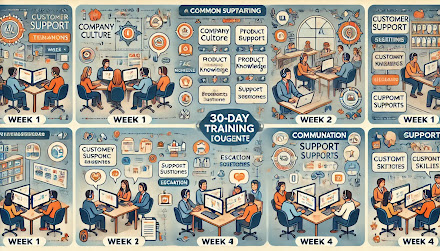Week 1: Introduction to Company Culture, Products, and Systems
During the first week, focus on familiarizing new agents with your company culture, department vision, and training related to products and support systems. This foundation helps agents understand their role within the organization and provides context for their work. As a resource, you could recommend the Power of Customer Support Department course on Udemy. This course helps new hires understand their career prospects in the support center and the value the support center brings to the business. Register for FREE.
Key Goals:
Understand company values, mission, and customer service standards.
Learn the basics of products/services offered.
Get acquainted with the tools and platforms (e.g., CRM, helpdesk software) they’ll use daily.
Example Activity:
Virtual “Shadowing”: Pair new agents with experienced team members for a virtual shadowing session. They can listen to live calls, observe chat interactions, and review email threads. Encourage them to take notes on handling complex issues and managing customer interactions. Direct them to this blog for insights on establishing powerful interactions: How to Make Powerful Customer Support.
Product Overview Training: Conduct product training sessions led by Product Trainers or Subject Matter Experts on key product features, use cases, and common customer questions. Offer hands-on time in a sandbox environment for agents to interact with the product. Creating a training roadmap outlining each week’s content helps agents know what to expect and trainers stay on track.
End-of-Week Checkpoint:
Schedule a quiz or interactive Q&A session on product basics and customer service standards. This will help agents consolidate their learning and identify areas for review.
Week 2: Mastering Common Support Scenarios and FAQs
In the second week, agents should focus on mastering typical customer inquiries and troubleshooting common issues. This week is about building confidence in handling repetitive tasks and equipping agents with tools to solve customer problems effectively.
Key Goals:
Familiarize the agent with the FAQ repository and standard responses.
Familiarize the agent with the Internal Knowledge Base where they can find answers to common questions.
Practice resolving common issues and managing customer interactions.
Example Activity:
Role-Playing Exercises: Create scenarios based on common customer inquiries and role-play them with new agents. For example, simulate an interaction where a customer has trouble logging into their account. Guide agents in using empathy, managing expectations, and leveraging resources to resolve the issue quickly.
“Top 10 Issues” Worksheet: Provide a list of the top 10 most frequent issues your team encounters and explain how to resolve them. Ask agents to create a troubleshooting checklist for each issue, helping them commit these steps to memory.
End-of-Week Checkpoint:
Conduct a mock support session with new agents. This safe environment allows them to practice solving common issues with real-time feedback.
Week 3: Advanced Issue Resolution and Customer Communication Skills
Once agents are comfortable with basic queries, focus on advanced issues and building strong communication skills. These skills are vital for handling complex or sensitive issues, managing escalations, and creating a positive impression on customers.
Key Goals:
Develop skills for managing complex, multi-step issues.
Refine communication skills, including tone, empathy, and clarity.
Example Activity:
Escalation Protocol Training: Train agents on the escalation process and when to pass issues to a higher-level agent or specialist. For example, in cases involving payment issues, agents should be trained on security protocols, escalation paths, and handling financial concerns. Teach both Functional (skills-based) and Management (authority-based) escalation types, using examples for clarity.
Personalized Communication Workshops: Hold workshops on effective communication tailored to your brand’s voice. For example, if your brand’s tone is friendly and approachable, coach agents to sound conversational while maintaining professionalism. Conduct empathy training to help agents view situations from the customer’s perspective.
End-of-Week Checkpoint:
Host a feedback session where agents receive constructive criticism on their handling of more complex scenarios and customer interactions.
Week 4: Responsibility in Handling Live Cases and Quality Assurance
In the final week, new agents should handle real cases with limited oversight. During this time, agents apply everything they've learned in a live environment while leaders monitor for quality and provide ongoing feedback.
Key Goals:
Handle live customer inquiries with minimal assistance.
Understand quality standards and meet performance metrics.
Example Activity:
Solo Case Handling with “Light” Monitoring: Allow agents to handle live support cases independently, with mentors available for support if needed. This gives agents hands-on experience and boosts their confidence.
Quality Feedback Sessions: Conduct daily check-ins to review live cases handled by the agent, focusing on response time, empathy, and issue resolution effectiveness. Encourage self-assessment and ask agents to identify one success and one area for improvement.
End-of-Week Checkpoint:
Perform a final quality assessment and review individual performance metrics, such as first contact resolution rate, response time, and CSAT (Customer Satisfaction) scores.
Ongoing Support: Mentorship and Continuous Learning
Training doesn’t end after the first 30 days. Encourage a culture of continuous improvement by offering mentorship, additional training, and skill-building resources. Regular review sessions and access to a mentor ensure that agents continue developing their skills over time.
Key Takeaways:
Provide Mentorship: Assign a “support buddy” to new agents for their first three months, creating a go-to resource for questions and guidance.
Set Milestone Goals: Establish achievable performance milestones at 60 and 90 days, helping agents build on their training and move toward full productivity.
By following this 30-day training guide, customer support leaders can ensure new agents gain the skills, confidence, and autonomy they need to excel in their roles and provide exceptional support to customers.
Enhance Your Support Leadership Skills
If you're a support leader looking to enhance your skills and build a successful support center consider these top Udemy courses:
Customer Support Team Leader Mastery Certification
Customer Support Business Planning
Customer Support Technology & Finance | Udemy

No comments:
Post a Comment